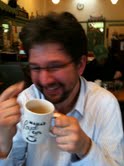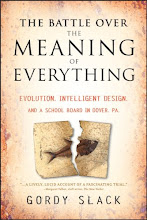 |
| Is "non-epileptic seizure" an oxymoron? |
Last night, at the American Epilepsy Society conference in San Antonio, I saw a debate between Salim Benbadis, a neurologist from Tampa, and Curt LaFrance, a psychiatrist and neurologist from Providence. These doctors were wrestling over whether the word "seizures" belongs in the diagnosis of "psychogenic non-epileptic seizures." (Also known as PNES.) These are seizure-like events on the outside, with no corresponding epileptic EEG activity on the inside. They are considered a kind of conversion disorder, usually caused by a trauma suffered by a patient who can't effectively process the associated emotions or express them verbally. PNES patients often end up in emergency departments where they're typically prescribed antiepileptic drugs, not to be properly diagnosed unless lucky enough to be seen by an epileptologist (often years after onset) who can definitively reach a PNES diagnosis with a video-monitored EEG. Even after getting properly diagnosed, the patients often get punted back and forth between neurologists--who say the patient's problems are psychological and not in the neuro bailiwick--and psychiatrists who see the seizures as neurological events and thus outside their domain.
Given that they aren't epileptic in any way, should these events be called "seizures" at all? Benbadis opened the argument saying that the word "seizure" creates confusion in his newly-diagnosed PNES patients. "I talk to them for half-an-hour explaining what they have and at the end they say, 'But do I still have seizures?' If I answer 'yes,' it can wipe out everything I've just explained." Better to call them "attacks" or "spells" or "episodes," he said.
Benbadis also argued that English dictionaries, both medical and non, associate "seizure" with epilepsy in the first or second definition. The association is a fact of modern usage, he said, and it is "very misleading" to use it to describe a non-epileptic event. It misleads the patient, certainly, but also the medical community.
LaFrance countered that the word "seizure" originally meant "to be taken hold of" and did not imply epilepsy. PNES patients are indeed "taken hold of" by their seizure-like events, he said. We should not surrender to the modern usage, he argued, simply because it's popular. More essential, though, was LaFrance's point that at first re-diagnosis, the PNES patient is being evicted from both the epilepsy and neurology communities. To kick the patient out of the "seizure" community at the same time, could leave them homeless, so to speak, and feeling still more vulnerable and betrayed.
"The practical reason for keeping the word "seizure" is that it validates the patient's experience and forms an alliance with the clinician." That alliance, says LaFrance, will be essential for effective treatment.
The Stanford psychiatrist moderating the debate, John Barry, synthesized the two positions, arguing that it may not really matter what you call the events, as long as you both 1) clearly convey the message that while they are not epilepsy, they are no less real, and 2) preserve the therapeutic bond.
Beneath the linguistics, but revealed by them, is a deeper struggle. Benbadis is not trained to care for these patients, he says, and he doesn't want to. He has enough work to do just tending his epilepsy patients, whom he can help. As long as the "attacks" that plague PNES patients are said to be "seizures," those patients will keep flooding his clinic. "Seizures" are things neurologists are obliged to treat; while psychological "attacks" or "episodes" are not.
Tanvir Syed is the exception who proves the rule. The one epileptologist in the audience who argued for keeping the word "seizure," the Cleveland-based Syed actually enjoys treating the many PNES patients who find their way to his clinic. He doesn't bother sending them to psychiatry; he knows they'll just boomerang back. And the psychiatrists don't really know how to help them anyway.
Tanvir Syed is the exception who proves the rule. The one epileptologist in the audience who argued for keeping the word "seizure," the Cleveland-based Syed actually enjoys treating the many PNES patients who find their way to his clinic. He doesn't bother sending them to psychiatry; he knows they'll just boomerang back. And the psychiatrists don't really know how to help them anyway.
And how does Syed treat his PNES patients? "With meditation," he says. "Teaching them to meditate gives them the strength of mind to deal with the emotions associated with their trauma."
I'm writing a long-form piece on PNES, so much more about this later.


3 comments:
Interesting discussion. Good post!
Some psychologist should try causing and mitigating "seizures" through hypnosis and auto-suggestion. Also examine "quaking" behaviour of Pentecostal Christians "filled with the Holy Spirit". (That's how the Quakers originally got their name)
As a PNES patient, it was clear to me that the problem wasnt with whether to call events seizures or not. It was with providing sufficient specific guidance to the patient so they trust you have faith in the treatment plan. No one really knew what to do with me and my family already had a relationship with an amazing neurologist. For example, i ultimately received care from a plastic surgeon's on staff psychologist. I kid you not, he was the region's leading - and only - specialist on PNES. This in addition to medications and follow ups with my neurologist. Anyway, food for thought. I blogged about some of my bad seizure days, the ones i could remember or i was told about, if youre interested in reading.
Post a Comment